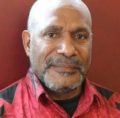
On 26 September it was reported that the West Papuan People’s Petition, together with the Global Petition for West Papua, had been handed over to the United Nations by Benny Wenda, spokesperson for the United Liberation Movement for West Papua (ULMWP).
Organisations and news services that covered the story included the ULMWP, The Office of Benny Wenda, Free West Papua Campaign, The Guardian (Australian edition) and the ABC.
According to these reports, the petition was signed by over 1.8 million people, representing over 70% of the West Papuan population, making it the largest democratic expression of the popular will in West Papua’s history.
The petition calls for a free vote on West Papua’s independence as well as the appointment of a UN representative to investigate reports of human rights violations by Indonesian security forces.
In collecting signatures for the petition, Benny Wenda was reported as saying that people “have risked their lives, some have been beaten up, some are in prison. In 50 years, we have never done this before, and we had to organise this in secret.” It has also been reported that 57 West Papuans have been arrested for supporting the petition and 54 tortured by Indonesian security forces during the course of the campaign. One activist, Yanto Awerkion, has been threatened with the charge of treason and could face 15 years in prison.
During the last week at the United Nations, numerous governments expressed their support for West Papua’s independence. These included seven Pacific Island nations, namely Solomon Islands, Tuvalu, Vanuatu, Nauru, Marshall Islands, Tonga and Palau.
The Deputy Prime Minister of the Caribbean nation of St Vincent and the Grenadines, Louis Straker, also expressed his support for the West Papuan people. He said, “We have great sympathy for the legitimate aspiration of the people of West Papua for freedom and independence through legitimate political means to govern themselves and guide their own destiny.”
Additional support came from the UK’s all-party parliamentary group on West Papua. Co-chair Alex Sobel said. “This inspiring act of mass democratic expression should definitively lay to rest rhetoric from the Indonesian government that West Papuans are content being part of Indonesia.”
Sobel added, “The people of West Papua have endured over 50 years of widespread human rights violations that have been described by many as a systematic genocide. It has become clear that in an ever worsening situation, the people of West Papua are not safe under Indonesian occupation.”
True to form, Australian Foreign Minister Julie Bishop expressed hostility to the petition. She said Australia had long recognised Indonesia’s ‘sovereignty’ over the Papuan provinces and that this position, supported by both the Coalition and Labor Party, was incorporated in the Lombok Treaty between Australia and Indonesia that came into force in 2008.
West Papua, formerly known as Netherlands New Guinea, was ruled by the Dutch after Indonesian independence in 1945 but the province was annexed by Jakarta in 1963.
Indonesia consolidated its control over West Papua in 1969 when 1,026 of West Papua’s population were hand-picked by the military and coerced into voting in favour of Indonesian annexation under a UN-supervised process known as the ‘Act of Free Choice’.
As Foreign Minister Bishop well knows, legal commentators have been highly critical of the vote ever since, dismissing it as a pseudo-choice and a betrayal of the principle of self-determination.
Dr Jason MacLeod, from the University of Sydney’s Department of Peace and Conflict Studies, was reported by ABC News as saying that the petition needed to be understood as a “fundamental rejection” of the Indonesian Government’s claim of sovereignty over West Papua.
“In a very clear and direct manner, the petition represents Papuans’ demand for decolonisation and self-determination, their desire to freely and fairly determine their own future,” Dr Macleod said.
More information
- Office of Benny Wenda, ‘Benny Wenda hands over West Papuan People’s Petition, signed by 1.8 million West Papuans’, Sep 27, 2017. This post contains the text of the petition.
- ULMWP, Media Release, Statement from the internal ULMWP Board Committee on the West Papuan People’s Petition, September 2017. The United Liberation Movement for West Papua (ULMWP) unites the three main political independence movements seeking independence for West Papua under a single umbrella organisation. The ULMWP was formed on 7 December 2014 in Vanuatu uniting the Federal Republic of West Papua (NRFPB), the West Papua National Coalition for Liberation (WPNCL) and the National Parliament of West Papua (NPWP).
- On the sham ‘Act of Free Choice’ refer to About West Papua on International Lawyers for West Papua’s website.
- International Parliamentarians for West Papua (IPWP) – launched in 2008, IPWP is a cross-party group of politicians drawn from around the world who recognise the legal right of self-determination for the people of West Papua.